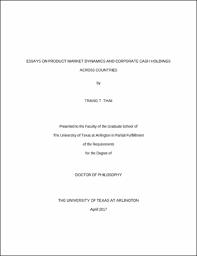| dc.description.abstract | My dissertation is composed of two essays that investigate two related yet distinct dynamics of product market and their influence on corporate cash holdings, and both are concerned with these dynamics being determinants of cash policy for international samples over the period of 1999-2015. The samples for the first and second essays respectively cover fourteen and ten countries that span not only developed countries but also emerging economies.
The first essay focuses on the impact of product market competition risk on corporate cash level. I construct a composite score of competition that captures three horizontal dimensions of product pricing competition that can be extended to international context. For all of sample component countries, Australia, Canada, France, Germany, India, Japan, Malaysia, Singapore, South Korea, Sweden, U.K. and U.S., I find that firm-level cash-to-assets ratio is positively associated with industry level of competition. My empirical finding is consistent with Hoberg, Phillips and Prabhala (2014) and supports the precautionary motive of holding cash. My analysis also highlights that the impact of competition on cash varies across firms and countries. Specifically, precautionary holding of cash under industry competition seems to be weakened for firms that are either dependent on external financing of incapable of raising capital. It is also weakened for firms in countries with better credit market development, weaker stock market development, and stronger investor protection. The functioning difference of credit market versus stock market is crucial in explaining cross-country variation of cash under industry competition.
The second essay concentrates on how product market predation risk affects corporate cash level. I propose two measures of takeover threat that captures the number of merger and acquisition deals and the total dollar value of merger and acquisition deals to target firms in each industry. I find that takeover threat is a determinant of cash holdings in the overall sample and six individual countries out of ten: Australia, Germany, India, Japan, South Korea, and U.S. This empirical result is consistent with Haushalter, Klasa and Maxwell (2007), supporting the holding of cash under precautionary/ deterrence motive. The other four countries, Canada, France, Sweden, and U.K., experience an opposite relationship that seems to be more in line with the monitoring / disciplinary effect of takeover on amount of cash. In addition, the positive impact of takeover threat on cash level is moderated for firms in countries with more developed credit market, higher economic freedom, better accounting standards, and stronger investor protection. | |


